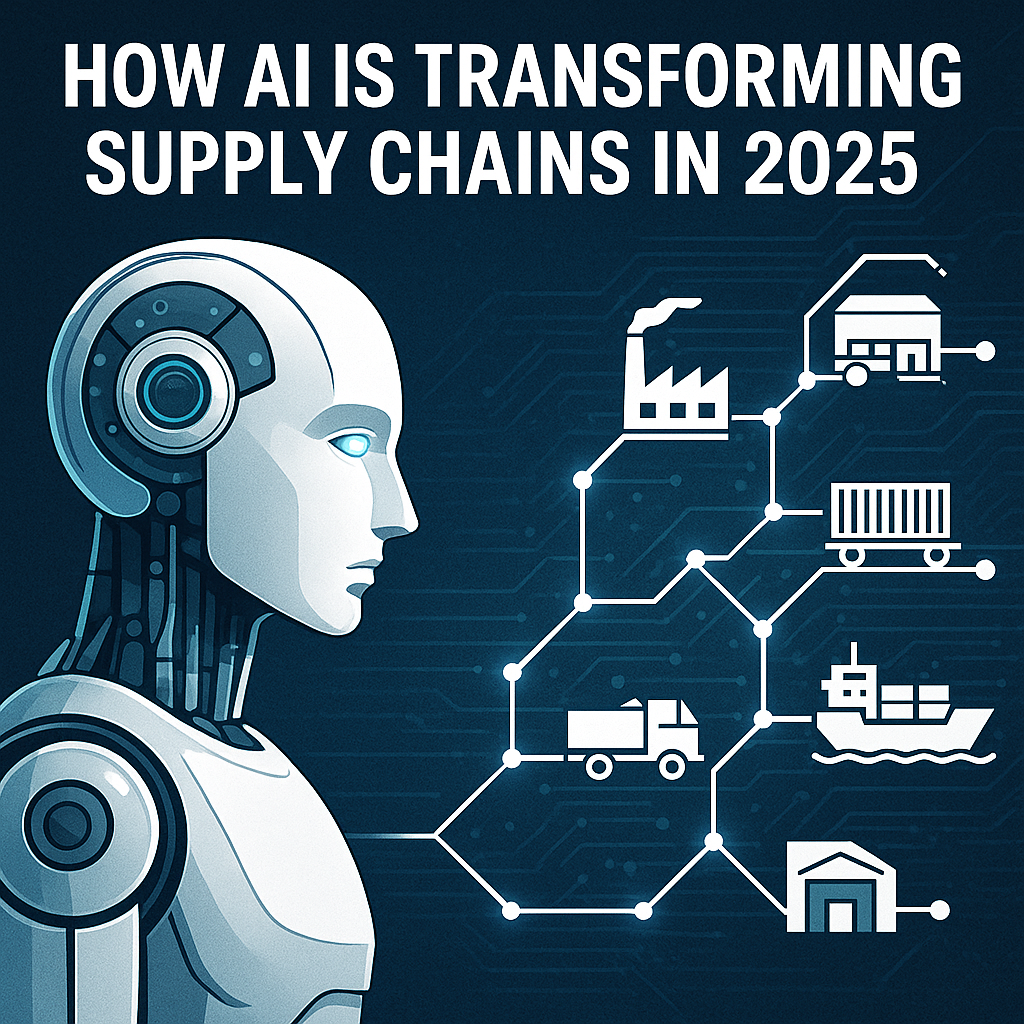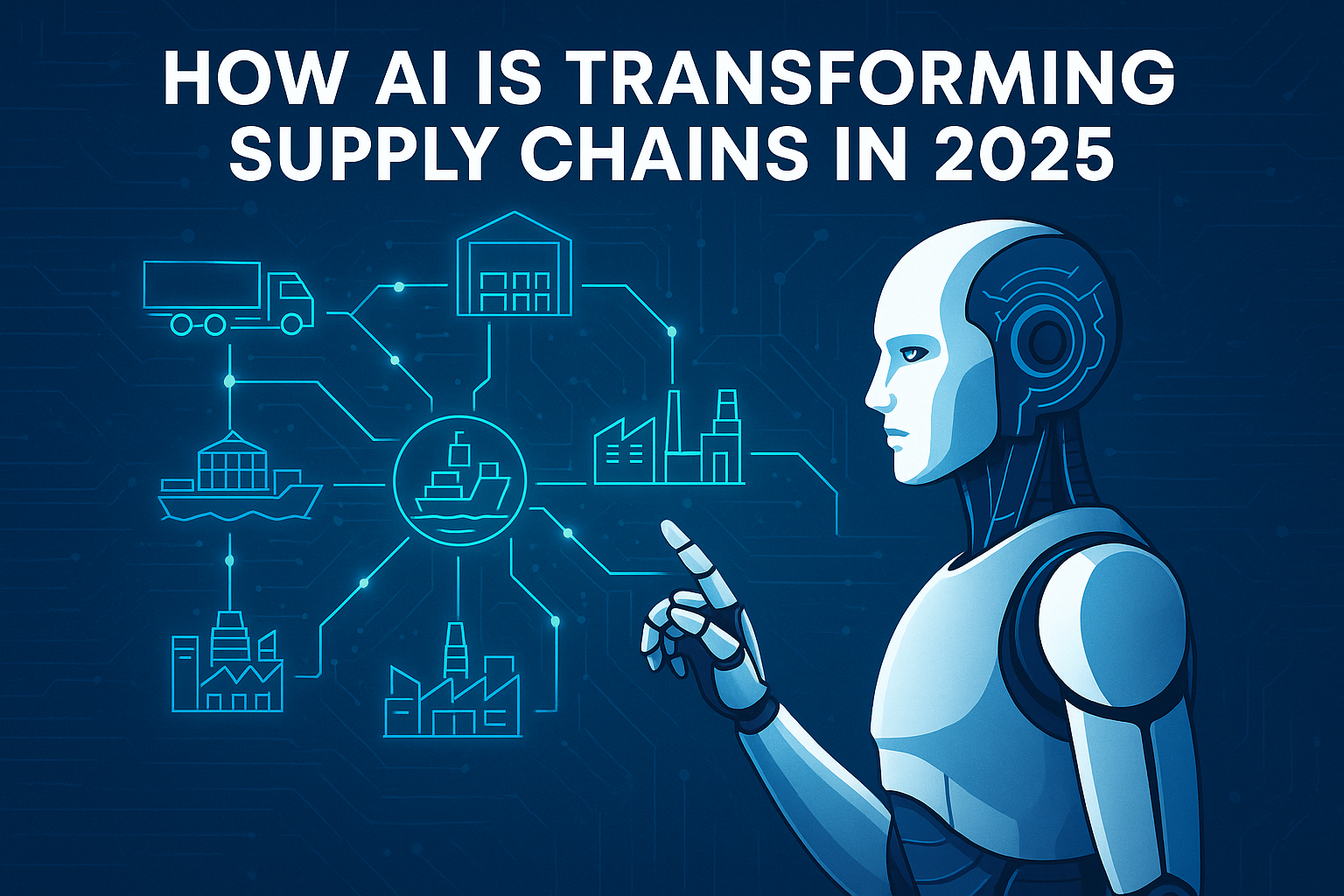Artificial intelligence and supply chain management are no longer distant worlds. They now form a powerful alliance that’s transforming the way companies operate globally. Every day, new systems emerge that reshape how goods move, how delays are avoided, and how decisions are made with speed and accuracy.
Today, understanding artificial intelligence and supply chain management is essential for anyone working in logistics, retail, or even small online businesses. Why? Because AI doesn’t just automate—it augments. It predicts demand, adjusts inventory, and routes shipments using real-time data. This combination saves time, cuts costs, and makes entire systems smarter.
Across industries, companies use artificial intelligence and supply chain management to anticipate disruptions before they happen. From natural disasters to supply shortages, AI enables faster, better decisions. If you’ve ever wondered how giants like Amazon or DHL keep things running smoothly, it’s not magic—it’s the result of years of developing powerful artificial intelligence and supply chain management tools.
And yet, this is just the beginning. More and more startups are building solutions that redefine how we think about delivery, warehousing, and customer satisfaction. The future of artificial intelligence and supply chain management promises automation, yes—but also greater transparency and sustainability.
Let’s explore this exciting shift. In the sections ahead, you’ll discover how AI works in real-world supply chains, how it’s changing the rules, and what this means for the future of logistics.

🧩 What Is Artificial Intelligence in Supply Chains?
Artificial intelligence and supply chain management start with a question: how can machines improve the flow of goods and information? AI gives systems the ability to learn, adapt, and make decisions. In supply chains, this means replacing slow human guesswork with fast, data-driven responses.
A supply chain involves many steps—procurement, production, storage, transportation, and delivery. Traditionally, each step required human oversight and lots of paperwork. Now, with AI, every point in the chain can become smarter. For example, an AI system can predict when stock will run low. It can even suggest the best supplier based on cost, reliability, and past performance.
This is where supply chain management artificial intelligence changes the game. AI doesn’t just respond to events—it anticipates them. By analyzing historical data, current trends, and even weather forecasts, AI systems help businesses stay one step ahead. The results? Fewer delays, reduced waste, and faster responses to unexpected issues.
Moreover, ai for supply chain management offers real-time visibility. A logistics manager can track every product from warehouse to customer using smart sensors and cloud-based dashboards. This level of control was impossible just a few years ago.
In short, ai supply chain management transforms complexity into clarity. It turns reactive systems into proactive ones. And most importantly, it brings speed, precision, and agility—qualities that are essential in today’s global market.
As we’ll see in the next section, these capabilities are not just theoretical. They’re already being used by companies worldwide to improve operations and reduce risks. Curious? Let’s dive into the real-world applications of this intelligent revolution.
🚚 Real-World Applications of AI for Supply Chain Management
The connection between artificial intelligence and supply chain management is already shaping the real world. Global companies are using AI to forecast demand, automate warehouse operations, and streamline logistics. Let’s look at how this transformation unfolds in practice.
First, predictive analytics helps retailers prepare for seasonal peaks. For example, Walmart uses AI algorithms to anticipate demand spikes during holidays. This prevents stockouts and reduces overstocking. Read more here.
Second, AI-powered robots work side-by-side with humans in fulfillment centers. Amazon relies on machine learning to optimize warehouse layout and speed up order picking. These robots reduce walking time and minimize human error. As a result, packages get out the door faster than ever.
Meanwhile, ai for supply chain management is making trucking smarter. Companies like UPS use route optimization systems to minimize fuel use and avoid delays. These systems adjust deliveries in real time based on traffic or weather. This leads to lower emissions and faster shipping.
In healthcare, ai supply chain management tools helped distribute COVID-19 vaccines. AI tracked temperature-sensitive shipments and predicted bottlenecks before they happened. This saved lives and built trust in global logistics.
Even small businesses benefit. Cloud-based AI platforms let startups forecast sales, automate reordering, and track supplier performance. That’s the power of supply chain management artificial intelligence—it scales from local to global.
These examples show that AI is not a buzzword. It’s a practical, measurable force. From warehouses to hospitals, artificial intelligence and supply chain management are delivering real results.
Up next, let’s explore how AI boosts efficiency while making supply chains greener and more sustainable.
♻️ The Impact of AI on Efficiency and Sustainability
Efficiency and sustainability are no longer just goals—they are essential pillars in modern supply chains. And this is exactly where artificial intelligence and supply chain management create lasting impact. AI not only accelerates operations, but also reduces waste and energy use.
Let’s start with efficiency. AI automates repetitive tasks, from inventory checks to supplier selection. This eliminates delays and reduces human error. For instance, AI can spot patterns in delivery times and suggest faster routes. That saves time, fuel, and money.
Supply chain management artificial intelligence also improves planning. By using predictive analytics, businesses can avoid overproduction and understocking. This precision reduces costs and improves customer satisfaction. When fewer products go unsold or expire, both profits and the planet benefit.
Now let’s talk sustainability. AI helps track carbon emissions, energy usage, and packaging waste. Companies can then act fast to meet environmental goals. Unilever, for example, uses AI to monitor supply chain emissions and find cleaner alternatives. See how.
With ai for supply chain management, firms can select the most eco-friendly suppliers. They can also optimize delivery schedules to reduce idle time and fuel consumption. Over time, these improvements create supply chains that are not just faster, but also greener.
AI gives companies data to make smart, ethical choices. It turns sustainability from a burden into a competitive advantage. That’s the strength of ai supply chain management—it combines profit with purpose.
So far, we’ve seen what AI can do. But what are the risks? Let’s look at the challenges and ethical concerns in our next section.
⚠️ Challenges and Ethical Questions in AI Supply Chain Management
While artificial intelligence and supply chain management offer incredible advantages, they also raise serious questions. These challenges must be addressed if AI is to support transparent, fair, and resilient supply chains.
First, let’s consider data bias. AI systems learn from data. If that data reflects past discrimination, the AI may reinforce inequality. For example, it might favor certain suppliers based on biased historical performance. This can create unfair barriers and reduce diversity in sourcing.
Next is the loss of human oversight. When businesses rely too heavily on AI, they risk ignoring context that machines can’t grasp. A delay due to weather may need empathy, not automation. That’s why ethical frameworks must guide AI use in logistics.
Supply chain management artificial intelligence also introduces privacy concerns. Tracking shipments often means tracking people. Companies must protect data while ensuring transparency. This balance is delicate, and missteps can damage trust.
Another challenge is job displacement. As AI systems take over tasks, some roles will evolve—but others may disappear. According to MIT, businesses must invest in reskilling programs to support workers affected by automation.
With ai for supply chain management, we also face the risk of over-automation. Systems that act without human judgment can make costly errors. That’s why human-AI collaboration, not replacement, should be the goal.
Despite these issues, the benefits remain strong. But businesses must build systems that are not just smart—but also ethical, inclusive, and human-centered.
Now that we’ve examined the risks, it’s time to shift gears. Let’s look ahead and imagine what the future holds for AI in global supply chains.
🚀 The Future of Artificial Intelligence and Supply Chain Management
The next decade will redefine artificial intelligence and supply chain management as we know them. We won’t just see smarter systems—we’ll witness fully autonomous, self-learning supply networks. These networks will adapt in real time, make decisions instantly, and recover from disruptions without human input.
Imagine a supply chain that fixes itself. When a shipment runs late, AI reroutes it instantly. If a supplier fails, the system finds alternatives in seconds. This is not science fiction. Companies like Siemens and Bosch are already building AI-driven ecosystems for predictive logistics. Here’s an example.
Supply chain management artificial intelligence will soon merge with blockchain and IoT. The result? Transparent, secure, and traceable supply chains. Consumers will track every step of a product’s journey—from factory to doorstep—with just one click.
At the same time, AI will support hyper-personalization. Businesses will tailor supply chains to each customer. Faster delivery, smarter packaging, and flexible returns will become the norm. Behind the scenes, ai for supply chain management will manage millions of micro-decisions with unmatched accuracy.
Yet, the real breakthrough lies in collaborative intelligence. Future AI won’t replace people—it will amplify them. Workers will use AI-powered dashboards, simulations, and assistants to solve problems faster and make smarter choices.
In the long run, ai supply chain management will enable resilience, speed, and fairness. But to get there, we must act now. The future belongs to businesses that embrace intelligent transformation with ethics and imagination.
And what about you? Are you ready to rethink everything you knew about supply chains? Let’s talk about it.
📣 Tell Us What You Think: AI or Human Supply Chains?
Now it’s your turn. You’ve just explored how artificial intelligence and supply chain management are reshaping our world. From smarter logistics to sustainable practices, the changes are happening fast—and they affect all of us. But here’s the big question: Do you trust machines to manage your supply chain? Or do you still believe humans must lead?
This isn’t just theory—it’s reality. Your online orders, your groceries, your favorite brands all depend on AI decisions right now. That’s why your opinion matters.
💬 We want to hear your voice.
Go to our Facebook or Instagram page and tell us:
👉 Are you excited, worried, or inspired by this AI revolution?
👉 Should we trust AI with everything—or keep a human hand on the wheel?
🔔 Follow us, join the conversation, and help shape the future of smart supply chains with Tooup.
Because your thoughts matter. Always.



